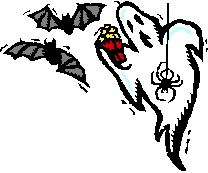What's the Deal with Black Cats?
By J Gardener
Halloween is the time of year when your child is inundated with visions of ghosts and goblins, witches and monsters. It's easy to understand how all these creatures have have earned their scary reputations-they represent unknown forces with "evil" intent, or at least the intent to scare little children every October.
Last week, Lynn, a mother of three young children, was walking with her youngest, when a neighbor's black cat wandered up, looking for some friendly attention. Lynn's little boy screamed in fear, demanding that his mom rush him home, before the "bad" cat got him. They have three cats at home, incidentally, but none of them are black. Apparently, though, he'd seen enough images of black cats, cavorting with all the other Halloween spooks, that he was certain something bad was about to happen.
We humans have always viewed cats as mysterious creatures-they're domesticated, like dogs, but independent and often aloof, frequently preferring to be alone, requiring only sporadic affection. Still, it's easy to see how witches and ghosts became continuing characters in our spooky traditions, but how did the black cat win its icon status in the Scary Hall of Fame? It's actually a status that seems to be peculiar to America.
In ancient times, as in many parts of the world today, the black cat represented a harbinger of good fortune, rather than danger. In ancient Egypt, well-to-do households held their pet black cats in high regard, granting them a place of honor in the home, in order to guarantee riches and prosperity.
Legend holds that, in the 17th century, King Charles I of England had a black cat which he believed was his good luck charm, and kept a round-the-clock guard on the prized pet. When the cat died (presumably of old age), the King lamented publicly that his luck was at an end. The very next day the king was arrested and charged with high treason, and was eventually executed.
In the past, in certain English fishing villages, the luck of the black cat-believed to bring fisherman safely home from the sea-was such an important tradition that fishermen's wives paid a huge price to obtain such a pet.
Even today, in many parts of the world, a black cat crossing one's path is considered good luck, the exact opposite of the American superstition.
Historians believe that the Pilgrims are responsible for the black cat's evil reputation in American today. When they emigrated to these shores for religious reasons, the Pilgrims brought with them a deep distrust of any superstition, believing such traditions were evil and dark.
Since the Middle Ages, many in England believed that those who practiced witchcraft used black cats as "familiars", or creatures who could commune with evil spirits, in order to carry out the witches' spells. Such was the fear of black cats that, for many years, in America, it was believed among certain religious sects that the only way to stop an evil spell was to shoot a black cat with a silver bullet.
Even today, most pet centers and animal shelters refuse to sell black cats around Halloween, for fear that they may be harmed or killed.
The next time a beautiful black cat crosses your-or your child's-path, wanting a little affection, try talking to it. If it rubs against your leg and purrs in approval, you be the judge of its intent. It has no idea that it's an object of fear-just like your tabby at home, it just wants a little love.
|

